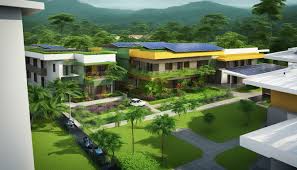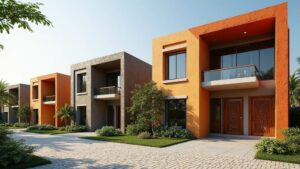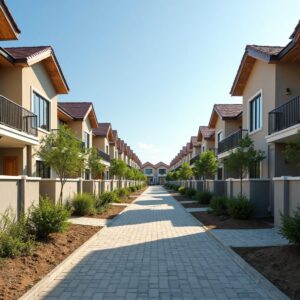In the heart of West Africa lies Nigeria, a nation bustling with life and ambition. As the country experiences rapid urbanization, the demand for housing and infrastructure grows exponentially. However, this growth often comes at the expense of the environment, highlighting the need for sustainable construction practices. Sustainable construction is not just a buzzword; it’s a necessary approach that balances development with environmental stewardship. This article explores the current state of construction in Nigeria, the benefits of sustainable practices, and the challenges faced in adopting these methods. We’ll also delve into successful case studies and the role of government policies in promoting green building.
The Current State of Construction in Nigeria
Nigeria’s construction sector is a vibrant industry, driven by the need for housing, commercial spaces, and infrastructure. However, the sector faces numerous challenges:
- Rapid Urbanization: Cities like Lagos, Abuja, and Port Harcourt are experiencing unprecedented population growth, leading to a surge in demand for housing and infrastructure.
- Environmental Impact: Traditional construction methods often result in significant environmental degradation, including deforestation, pollution, and resource depletion.
- Infrastructure Deficits: Despite the demand, there is a significant gap in the provision of adequate infrastructure, exacerbating urban challenges such as traffic congestion and poor living conditions.
- High Costs: The cost of construction materials and labor in Nigeria can be prohibitively high, making it difficult for many to access affordable housing.
The Benefits of Sustainable Construction
Sustainable construction offers a pathway to addressing these challenges while promoting long-term environmental and economic benefits. At its core, sustainable construction involves the use of environmentally friendly materials and practices to minimize the environmental impact of building projects. This approach not only helps to preserve natural resources but also contributes to the creation of healthier, more energy-efficient buildings.
Key Principles of Sustainable Construction
Sustainable construction is guided by several key principles, including:
- Energy Efficiency: Buildings are designed to minimize energy consumption through the use of energy-efficient materials, renewable energy sources, and smart building technologies.
- Use of Local and Renewable Materials: Prioritizing the use of locally sourced, renewable, and recycled materials reduces the environmental footprint of construction projects.
- Water Conservation: Implementing water-saving technologies and practices helps to reduce water usage during and after construction.
- Waste Reduction: Minimizing waste through efficient material use and recycling programs reduces the environmental impact of construction activities.
- Community Engagement: Involving local communities in the planning and execution of construction projects ensures that their needs and concerns are addressed, fostering a sense of ownership and responsibility.
Case Studies: Sustainable Construction in Action
Several projects in Nigeria exemplify the successful implementation of sustainable construction practices:
- The Lagos Eco-Friendly Housing Project: This initiative focuses on building affordable, energy-efficient homes using locally sourced materials. The project not only provides much-needed housing but also serves as a model for sustainable urban development.
- The Abuja Green Building Initiative: This program promotes the use of green building technologies and materials in both residential and commercial construction. By incorporating solar panels, rainwater harvesting systems, and energy-efficient appliances, the initiative aims to reduce the environmental impact of buildings in the capital city.
- The Kano Recycled Material Housing Project: This innovative project utilizes recycled materials, such as plastic bottles and scrap metal, to construct affordable housing units. By transforming waste into valuable resources, the project addresses both the housing shortage and environmental pollution.
The Role of Government and Policy in Promoting Sustainable Construction
Government policies and regulations play a crucial role in promoting sustainable construction practices in Nigeria. By incentivizing the use of sustainable materials and technologies, the government can encourage developers and contractors to adopt greener construction methods. Some potential policy measures include:
- Tax Incentives: Offering tax breaks or rebates to companies that incorporate sustainable practices into their projects.
- Building Codes: Establishing and enforcing building codes that promote energy efficiency and environmental sustainability.
- Public-Private Partnerships: Collaborating with private sector entities to finance and execute sustainable construction projects.
- Training and Education: Providing training programs for construction professionals on sustainable construction techniques and materials.
The Future of Sustainable Construction in Nigeria
As Nigeria continues to grow and develop, the importance of sustainable construction will only continue to increase. By embracing sustainable practices, the country can address its pressing development challenges while protecting the environment for future generations. The success of sustainable construction in Nigeria will depend on the collective efforts of government, private sector entities, and local communities. Together, they can build a future that is not only prosperous but also sustainable and resilient.
Sustainable construction is not just a trend; it is a necessity for Nigeria’s future. By adopting environmentally friendly practices and materials, the country can address its infrastructure deficits, reduce its environmental impact, and create healthier, more livable spaces for its citizens. As Nigeria continues to build and grow, let us commit to a future where development and sustainability go hand in hand.
What are your thoughts on sustainable construction in Nigeria? Share your ideas, experiences, and questions in the comments below. Don’t forget to subscribe to our newsletter for more insights on construction, sustainability, and urban development in Nigeria. Let’s build a greener future together!






